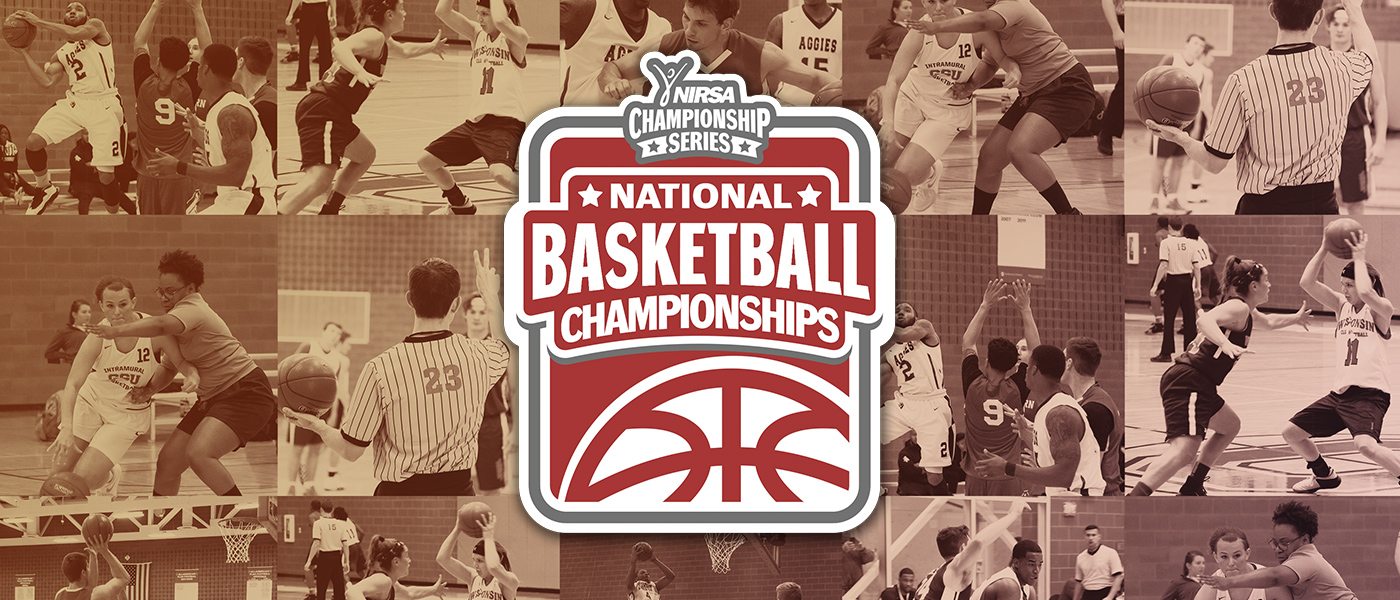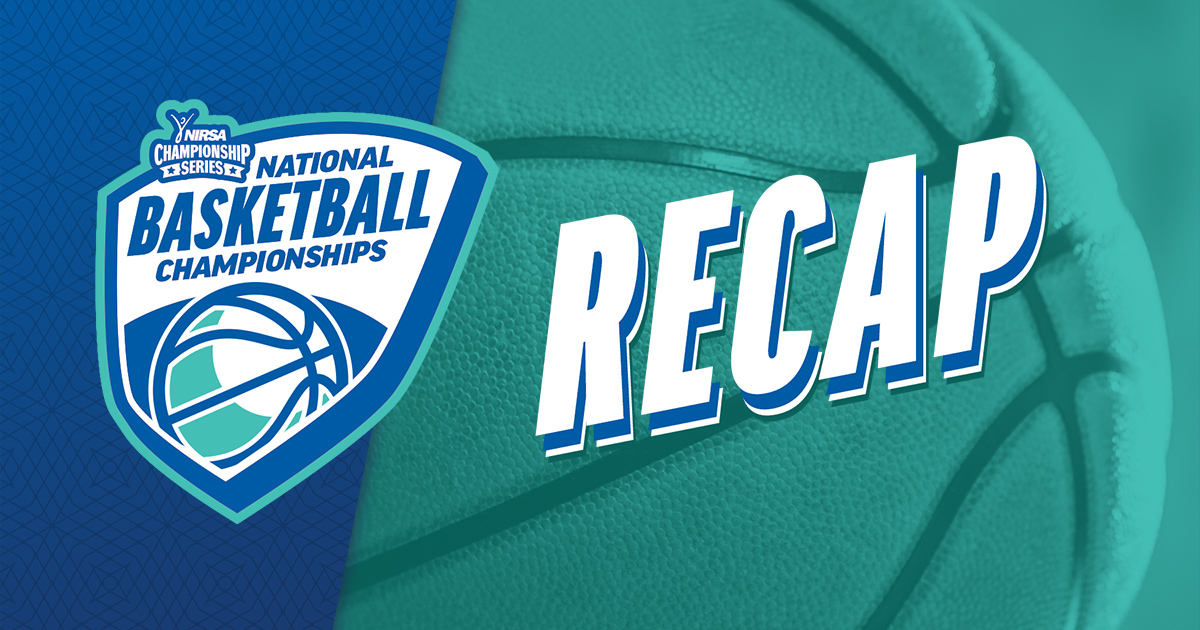Former British Prime Minister Benjamin Disraeli said it best: “Change is inevitable, change is constant.” The 2018 NIRSA Championship Series National Basketball Championship proved that point as a staggering 98 teams descended upon Columbus to give The Ohio State University one final hurrah—it’s the school’s third consecutive and fifth total year serving as tournament hosts—before changing venues for 2019. Titles also changed hands this year as the Men’s and Women’s Club and Intramural Divisions and Unified Sports Division all crowned new overall victors heading into Wichita next year.
Tournament operations: a well-oiled machine
It takes an incredible amount of planning to make sure 1,046 participants from 42 states enjoy their experiences at the national championship. With two years already under their belt, Ohio State felt confident that its third iteration would be its finest.
Dexter Shorter, Competitive Sports Coordinator and tournament-co-director, said of the championship’s overall organization, “Everyone who helped us run the tournament did outstanding work. From the student staff and officials to the professionals and our special guests, everybody rocked it. I’m confident in saying that the 2018 tournament was the best one out of the three basketball championships that we hosted in Columbus. Everything ran smoothly from start to finish this year.”
Dexter adds, “We learned so much during our time hosting the NIRSA National Basketball Championships. However, the most important takeaway that really resonates with me is that relationships are very powerful. It is an absolute fact that we win with people. Thank you so much to all of our sponsors, partners, colleagues, and special guests who made the tournament experience extraordinary and memorable for our students. There are some very talented individuals within our Association and we have some great partnerships connected to our profession that are genuinely focused on elevating what we do.”
Volunteers are the heart and soul of the tournament’s operation. Megan Morris—Chair of the NIRSA Championship Series Basketball Work Team, tournament co-director, and Director of Campus Recreation at Loyola University of Chicago—was thankful for the hard work and attention to detail each volunteer paid to operations. “I was most impressed by the teamwork displayed both on and off the court by teams, officials, and staff to pull off such a largescale event,” she says. “There are so many moving parts to put on the tournament that it takes an army of folks to make it happen, but it also takes the teams working together to get to the event to make it all come together.”
“The volunteers are passionate and well qualified to run this type of event. A tournament of this scale isn’t possible without volunteers who possess both those traits. Everyone there has the same goal: a successful event that is enjoyed by teams and teaches valuable skills to officials and staff. This tournament is really a definition of what it means to be a NIRSA member,” she says. “A chance to learn, network, and—most importantly—give back to the student participants and officials through volunteering and their craft.”
The NIRSA Championship Series’ social media presence solidified its presence even more this tournament. Twitter, Instagram, and Snapchat were active with a pictorial perspective of the tournament as well as updates about teams and how they were faring in action. New this time around was a “whip-around coverage” of live gameplay during the pool play and bracket rounds. The media relations team gave look-ins to games as they were occurring on Twitter.
The games were also uploaded to the NIRSA Championship Series YouTube channel so the coverage could be re-watched and archived. Our Instagram story was also active, getting some great footage of behind-the-scenes happenings and special events such as the dunk contest and three-point shootout. Thanks to this coverage, more family and friends who couldn’t make the tournament were able to follow their favorite institutions more easily than before.
More than just wins and losses
One game at a time. That seemed to be the overarching theme at this championship tournament. Each team needed to take the games as they came and find the best strategy to win and keep their Sunday hopes alive. For many, winning that first contest alleviates a lot of pressure.
Anthony Williams from the Ole Miss men’s club team felt the best way to win their first game was “rebounding, pushing the tempo, and killing them with the three-point shooting we have.” Elisa Bilderback of the University of Wisconsin-Milwaukee women’s club team felt that the way to win was “to play together, have a lot of energy, and have fun.” When talking with the players, fun seemed to be an operative word for their thoughts about the tournament. Players were smiling during warm-ups, and some even had energetic pre-game rituals that helped focus them on enjoying themselves and the moment.
The Unified Sports Division had a large jump in participation at the tournament this year. Teams from the United States and Canada were locked in and ready to compete for the Unified Division crown. The division has always provided fast-paced play and amazing shooting to keep spectators on the edge of their seats.
While the physical play was amazing, the sportsmanship and comradery displayed by all athletes in the division reminded everyone watching that integrity outweighs the sport. Amanda Alpert, Director of the Unified Sports Division and Assistant Director of Intramural Sports and Sport Clubs at Ole Miss, said, “This year, I’m really excited to have eight teams for the Unified Division, which expanded from last year. We have some new teams that have never played here before, so we’re really looking forward to having new competition and having everyone experience this great tournament.”
As is tradition at the NIRSA Championship Series National Basketball Championship, the Saturday Night Unified Sports Banquet did not disappoint. From dancing to music to fun contests, the Unified Division highlighted the building of community through competition and commonality. The sense of unity could be felt through the RPAC as teams broke bread and enjoyed each other’s company, putting aside wins and losses for friends and respect. This event proved that the Unified Sports Division has strengthened and will continue to do so in the coming years.
Officiating for life
Student officials are often one of the largest volunteer groups at tournaments as well as one of the most scrutinized due to their role, and at this tournament 57 student officials came from 44 institutions around the country. These individuals are selected through regional tournaments and at-large application, and all have an opportunity to meet life-long mentors and receive critical feedback that allows them to hone their skills in a craft that demands exemplary concentration and judgment.
Special guest clinicians such as National Scouting Advisor for NBA Referee Operations JB Caldwell, NCCA Men’s Officials Coordinator JD Collins, and NBA Senior Vice President & Head of Referee Operations Michelle Johnson gave inspirational advice and preached the message of transferable skills from officiating to life.
The theme for this year’s officiating group was “Officiating for Life: Transferring Skills from Officiating Off the Court.” John Washo, Associate Director of Program – Campus Life at DePaul University and tournament co-director of officials, wanted this subject to be prevalent throughout the championship. “That theme ran through the weekend, from Michelle Johnson’s keynote later that night, through our all-day officials’ clinic on Friday, and into J.D. Collins presentation, ‘Life Skills from Officiating,’ where he spoke very little about officiating and largely on leadership,” says John.
He adds, “That theme continued as we met with the group during the tournament and as clinicians provided feedback each game they worked. It was also an opportunity for our professional committee members to grow and develop in these areas as they presented on topics ranging from communication, conflict resolution, professionalism, navigating life balance while trying to officiate, and dealing with setbacks. All skills that translate both on and off the court.”
Ashley Lax, Assistant Director of Competitive Sports at the University of Wisconsin-Madison and tournament co-director of officials, also added, “For these officials, expectations are high. They are the best of the best of the country. The teams, spectators, and guests expect the officials to officiate at a national level. The teams’ entire season is on the line every game, and our officials must put their best on the court every game too. On top of that, they are being critiqued and evaluated with the expectation that they get better every game. They are also trying to add in new elements of positioning and decision making to their officiating while trying to call a game without mistake. That is a lot of expectation to manage as a student official. But our group did a fantastic job of balancing the needs of the tournament while also focusing on their own development.”
“I think there are two big components that make the tournament challenging for officials outside of the number of games they work,” continues Jon Broska, Assistant Director of Competitive Sports at the University of Florida and tournament co-director of officials. “First, the officials are working with other officials they have never met, who work in different parts of the country at varying levels, and have been taught different ways of doing things. It takes some time to build chemistry amongst the entire staff of officials as well as the individual crews. Secondly, many of the teams have coaches and fans that add pressure and intensity to the game. Many officials are not accustomed to answering questions and comments from coaches and vocal team captains. Each game brings passion and enthusiasm from players, coaches, and spectators, and that is a difference that our officials must adjust to.”
Student official Amir Ebrahimi from George Mason University echoed many of the sentiments of the referees attending this weekend. Regarding the opportunity presented, Ebrahimi explains, “I really look forward to just being a sponge and absorbing all of the great content that these evaluators are providing us, and having people here like Ed Rush and Rob Rorke here teaching us is going to be a great environment for all of us.”
Taking the tournament west
With the conclusion of the 2018 tournament, The Ohio State University concludes its term as the national host of The Series basketball. After considering all site applications this past season, the Championship Series is proud to announce that Wichita, Kansas will be the host city for the next three national championships and that Wichita State University will be the host institution of the national tournament. The state of Kansas is no stranger to high-level basketball, and it provides a great backdrop for the venue change.
“Wichita Hoops is a 113,000 sq. ft. facility that includes 12 basketball courts, a viewing mezzanine, and two concession stands,” explains Austin Sanderson, Competitive Sports Coordinator at Wichita State University. “One of the new aspects Wichita Hoops will bring to the competition is the AAU Tournament atmosphere. When someone walks in, they will see six courts of basketball to their right and six courts of basketball to their left. This facility was built with the primary purpose to host tournaments such as the NIRSA Championship Series National Basketball Championships.”
Austin knows that a successful first year in a new venue is crucial to continuing the success of The Series. “Any time there is a change in sites, it opens up opportunities for additional schools to participate who could not before because of various barriers,” he says. “Being centrally located, I believe we have an opportunity to have some of the larger tournaments over the next few years. Even though we will not be on campus for the competition itself, I believe Wichita Hoops will not disappoint.”
Champions and All-Tournament recognition
Congratulations are due to the following teams and individuals who earned the national championship or all-tournament honors:
Men’s Club Championship: Texas A&M University
Women’s Club Championship: University of North Carolina, Chapel Hill
Men’s Intramural Championship: North Carolina A&T State University – Undisputed
Women’s Intramural Championship: Grand Canyon University – Hoop Dreams
Unified Championship: University of Toronto – Unified
Men’s Club All-Tournament
Derek Cahn – Texas A&M University (Team MVP)
Jacob Casey – University of Wisconsin-Madison
Kyle Hellman – University of Wisconsin-Madison
Pedro Pabon – University of South Florida
Trevor McQueeny – University of Northern Colorado
Jay Payton – Texas A&M University
Women’s Club All-Tournament Team
Ellery Hepburn – University of North Carolina at Chapel Hill (MVP)
Monique Abbs – Prairie View A&M University
Sam Olson – North Carolina State University
Lauren Killilea – North Carolina State University
Allison Vansant – University of North Carolina at Chapel Hill
Sarah Mgbeike – Houston Community College
Men’s IM All-Tournament Team
Jay’len Hollis – North Carolina A&T State University (MVP)
Brazhton Wilson – University of Central Florida
Thomas Marshall – Alabama A&M University
Austin Trafelet – Eastern Washington University
John-Henry Woodward – Eastern Washington University
Elijah Evans – North Carolina A&T State University
Women’s IM All-Tournament Team
Hannah Frederick – Grand Canyon University (MVP)
Sheniqua Young – Georgia Southern University
Azjuri Aguebor – Georgia Southern University
Narshanda Malone – Columbus State University
Shannon Thompson – Angelo State University
Saylor Siegner – Grand Canyon University
Unified Sports All-Tournament Team
John Hannat-Minchel – University of Toronto (MVP)
Kiandre Brown – University of Florida
Ben Caplan – University of Toronto
Jeremy Mercer – University of Louisville
Nathaniel Perkins – University of Oakland
Ariel Kantor – Duke University
All-Tournament Officials
Amir Ebrahimi, George Mason University
Daniel Chandler, James Madison University
Matt McGuier, University of Central Florida
Brandon Ingram, University of North Carolina at Wilmington
Quaniece Spearman, Mercer University
Ryan Olson, Eastern Washington University
Kris Pullam, University of Wisconsin-Whitewater
Xavier Bell, Louisiana State University
Chase Norman, East Carolina University
For complete tournament coverage, including game recaps and award winners, visit the NIRSA Championship Series blog, check out the @NIRSAChamp handle on Twitter and Instagram, and visit the NIRSA Championship Series YouTube channel. To learn more about the NIRSA Championship Series—including information on 2018–2019 regional and national tournaments—visit the NIRSA website.
We look forward to seeing all competitors and volunteers in Kansas for the 2019 NIRSA National Basketball Championship!
Series Talk
- For more information, please contact NIRSA Director of National Sport Programs Valerie McCutchan.






